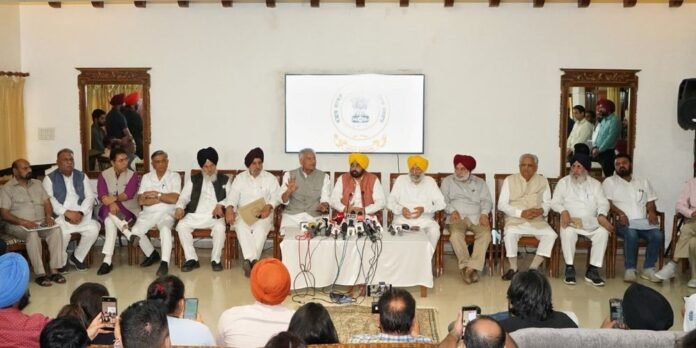Saptrishi Soni: In an increasingly water-stressed India, a high-stakes political and ecological standoff is intensifying in the northern state of Punjab. On Friday, Chief Minister Bhagwant Mann convened an all-party meeting in Chandigarh, rallying the state’s political factions under a rare banner of unity. The issue on the table: Punjab’s deepening water crisis, and what its leaders see as growing federal pressure to divert the state’s dwindling resources to neighboring Haryana through the Bhakra Beas Management Board (BBMB).
At the heart of the dispute is an urgent question of water equity and federal authority. Punjab, traditionally known as the breadbasket of India, is confronting a harsh paradox—its fields may be fertile, but its aquifers are rapidly depleting. The state now finds itself pushing back against what it views as coercive demands by the central government, channeled through the BBMB, to release an additional 8,500 cusecs of water to Haryana. The move has not only ignited political tempers but has also exposed the fault lines in India’s fragile water-sharing arrangements.
Chief Minister Mann, addressing the press after the meeting, was unequivocal. “Every drop of water in Punjab belongs to Punjabis,” he declared. “We are already giving Haryana drinking water out of humanitarian concern. But we do not have even a drop more to spare.” His statement echoes the growing frustration of a state whose groundwater table has been sinking alarmingly over the past two decades, primarily due to unsustainable agricultural practices and erratic monsoons. According to the Central Ground Water Board, over 80% of Punjab’s blocks are now classified as ‘over-exploited’.
Friday’s meeting, attended by leaders across party lines—including the Bharatiya Janata Party’s Sunil Jakhar—culminated in a unanimous show of solidarity. For perhaps the first time in recent memory, political differences took a backseat as participants pledged to resist what they described as “bulldozing tactics” from the Centre. Jakhar, normally an opponent of Mann’s Aam Aadmi Party, echoed the sentiment: “Punjabis will not tolerate coercion. This matter transcends politics—it is about survival.”
Adding weight to the state’s stance, the Punjab Vidhan Sabha has been summoned for a special session on Monday to deliberate and decide on the path ahead. Meanwhile, Union Home Secretary Govind Mohan has called a parallel meeting in Delhi with senior officials from all partner states in the BBMB, signaling that New Delhi is not backing down.
Water, once a quiet undercurrent in India’s federal politics, is fast becoming a central fault line. In Punjab, the fear is not just about sharing—it’s about survival. And while Haryana claims its rightful allocation under previously agreed frameworks, Punjab argues those understandings were forged in a different era, under vastly different ecological conditions. Today, the narrative is shifting from inter-state cooperation to intra-state preservation.
The Punjab government’s invocation of Bhai Ghanaiya—a revered Sikh figure known for offering water to all during battle, friend and foe alike—adds an emotional and historical layer to its stand. Yet, the chief minister was candid: “We are heirs to his legacy, but we cannot pour from an empty vessel.”
As climate change sharpens water scarcity across South Asia, the dispute between Punjab and Haryana may well be a harbinger of similar conflicts to come. In a country where monsoons are becoming increasingly unreliable and demand continues to rise, India’s governance systems will be tested—not just on distribution, but on empathy, foresight, and sustainability.
This article is auto-generated from verified news sources and does not reflect editorial opinion.
#PunjabWaterCrisis #IndiaWaterConflict #ClimateStress #BhakraBeasDispute #SouthAsiaEnvironment




